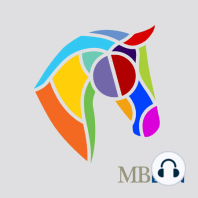27 min listen
3. Top 11 Most Common Causes of Colic in Horses
FromMad Barn Academy
ratings:
Length:
24 minutes
Released:
Dec 5, 2022
Format:
Podcast episode
Description
Colic is a painful, sometimes fatal, condition that strikes fear in the heart of any horse owner. Many cases of colic are mild and can be resolved with veterinary intervention. Others are severe enough to necessitate surgery.
The term 'colic' is used to describe abdominal pain in horses. It is not one specific condition but rather a symptom associated with numerous abnormalities that affect the horse's digestive organs.
Horses evolved to graze on roughage for most of the day while constantly moving. However, modern management practices are not always aligned with the natural lifestyle of horses. Practices such as stall confinement and low forage intake can increase the risk of colic.
The most common types of colic are related to impaction, in which undigested feed or foreign bodies such as parasites block the movement of digesta through the intestines and cecum.
More serious cases involving “twisted gut” can block blood flow to the area, causing tissue death. This needs to be rectified by surgery to avoid further complications.
Learn more about the top causes of colic in horses at https://madbarn.ca/colic-causes-in-horses/
You can also learn how to prevent colic in this article: https://madbarn.com/prevent-colic-in-horses/
_______________________________
Mad Barn Academy is dedicated to supporting horse owners and equine practitioners through research, training and education. Visit us at https://madbarn.com for more resources, videos and articles.
The term 'colic' is used to describe abdominal pain in horses. It is not one specific condition but rather a symptom associated with numerous abnormalities that affect the horse's digestive organs.
Horses evolved to graze on roughage for most of the day while constantly moving. However, modern management practices are not always aligned with the natural lifestyle of horses. Practices such as stall confinement and low forage intake can increase the risk of colic.
The most common types of colic are related to impaction, in which undigested feed or foreign bodies such as parasites block the movement of digesta through the intestines and cecum.
More serious cases involving “twisted gut” can block blood flow to the area, causing tissue death. This needs to be rectified by surgery to avoid further complications.
Learn more about the top causes of colic in horses at https://madbarn.ca/colic-causes-in-horses/
You can also learn how to prevent colic in this article: https://madbarn.com/prevent-colic-in-horses/
_______________________________
Mad Barn Academy is dedicated to supporting horse owners and equine practitioners through research, training and education. Visit us at https://madbarn.com for more resources, videos and articles.
Released:
Dec 5, 2022
Format:
Podcast episode
Titles in the series (61)
6. Heaves in Horses by Mad Barn Academy
